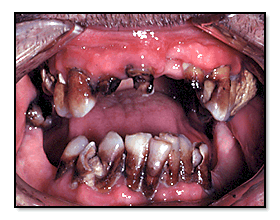Navigate
- Effects of Meth
- Meth Addiction
- How Meth is Used
- Meth in the News
- History of Meth
- Pictures of Meth
- Crystal Meth
- Identifying a Meth User
- Children of Meth Users
- Meth Lab
- Meth Prices
- Meth Slang Terms
- Meth User Pictures
- Dangers of Meth
- Meth Addiction Help
- Meth Babies
- Meth Lab Photos
- Meth Labs
- Meth Rehab
- Meth Mouth
- Meth Statistics
- Meth Symptoms
- Meth Teeth
- Meth Users
- What is Crystal Meth
- Meth Run
- Definition of Meth
- Meth and the Mind
- Meth Behavior
- Tweaker
- Meth Recovery
- Meth Versus Cocaine
- What is Meth Made Of
- Meth and the Brain
- Meth Mental Effects
- Meth Side Effects
- Meth Long Term Health Effects
- Meth Federal Guidelines and Regulations
- Methamphetamine
- Meth and Sexual Behavior

Meth Teeth
Meth teeth are the result of poor oral hygiene by meth users. Dental problems are common among meth users. Many do not take care of their teeth on a regular basis and most do not see a dentist often. Meth users face some specific issues with their teeth and mouth, partly due to the ingredients and method of use. Meth teeth includes the direct and side effects of the drug and lifestyle choices of the user. Dentists and dental hygienists are urged to become familiar with the symptoms and what precautions to take when treating an abuser. While the symptoms alone do not prove Meth use, taken together with other signs, they may help health workers diagnose meth abuse.

Meth Teeth Symptoms
- Dry Mouth - Saliva acts as a buffer against acidic substances in the mouth, neutralizing it and protecting teeth against acidic foods like lemons, acid from the gut or acidic plaque. The average person creates around one liter of saliva a day. If saliva production is reduced, oral bacteria levels can increase ten times over normal levels. Meth dries out the salivary glands. Without saliva, the acidic substances can eat away at the minerals in tooth enamel, causing holes or weak spots that turn into cavities. Other medications dry the mouth but meth is especially bad.
- Tooth Decay - Meth users are notorious for trying to treat cottonmouth with lots of sugary soda. The bacteria that feed on the sugars in the mouth secrete acid, which leads to more tooth decay. Also, Meth users aren’t likely to floss, brush and rinse when high. A typical cavity starts in-between two teeth. It eventually invades the tooth and destroys it from the inside out. Meth teeth decay invariably starts at the gum line - it eventually spreads around the entire tooth, eating swathes of enamel in its wake.
- Cracked Teeth - Because the drug can make them feel anxious or nervous, causing them to clench or grind their teeth, regular meth users may develop cracks in their teeth.
- Gum Disease - Teeth and gums need blood to stay healthy. Meth causes the vessels that supply blood to oral tissues to shrink up. Reduced blood supply causes tissues to break down. With repeated shrinking, the blood vessels don’t recover and tissues die.
One meth addict comments, "I got what I deserve, I guess... it's bad enough you want to shoot yourself, that's how bad it gets." His meth mouth is so advanced, he'll likely lose every one of his once pearly whites. "In fact that's really what meth mouth is," Dr. Roberts explains, pointing to the inmate's badly damaged teeth. "The blackness is the fact the enamel is gone. The black you see is the dentine underneath."
Ten years of being addicted to methamphetamine left Joyce (another meth addict) with brittle and decaying teeth — and those are the ones that haven't already fallen out. She said the only way to alleviate the pain was to use more drugs, creating a vicious cycle.
"You could be eating ice cream, and a piece of the tooth would chip off," said Joyce, not her real name. "I can remember laying in bed and crying, because it hurt so bad. It felt like the whole side of my face was throbbing."
Joyce said she used drugs to get rid of the pain or would go to a hospital emergency room and get injected with a painkiller.
"I'd wake up with my mouth swollen and infection going into my eyes," she said.
Frank Calkins of the Adams County Probation Department says meth "tears teeth up." He estimates at least one of every five meth addicts on his caseload has serious teeth problems. "I do know one meth user whose teeth were immaculate, but that's because she took care of them and flossed three or four times a day," Calkins said.
